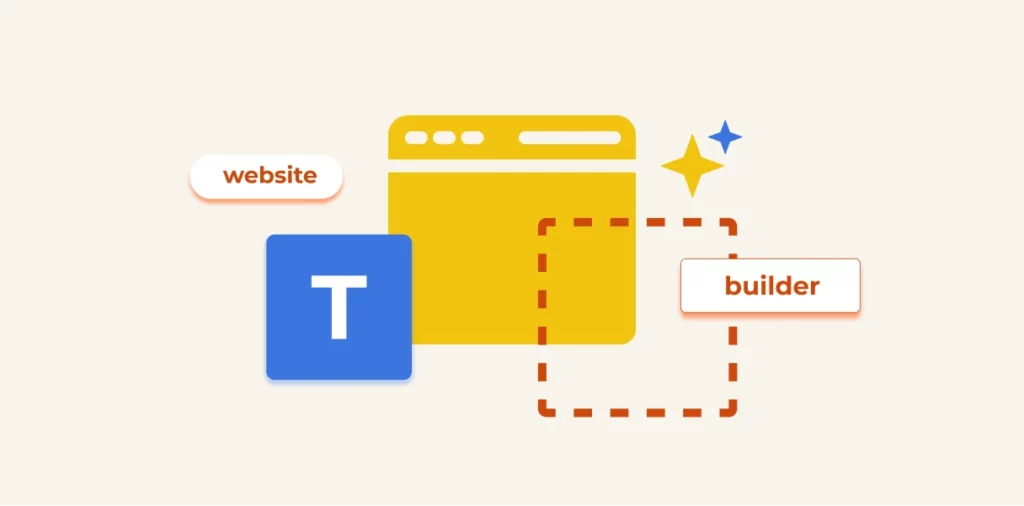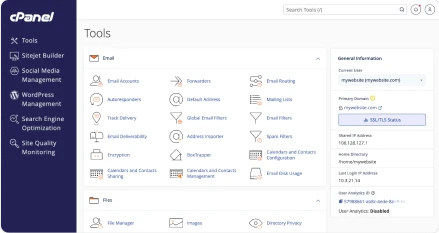If you’re ready to build a website but aren’t sure where to start, choosing the right website builder is key. Whether you’re setting up a business site, an online store, or a personal portfolio, the right platform can make the process much easier.
This guide breaks down the top website builders to help you create a great-looking site that fits your needs quickly and easily.
Short Summary
| Website Builder | Best For | Starting Price |
| Sitejet | Agencies and designers needing advanced customization | $15/month or free with your cPanel instance |
| Wix | Beginners and users who want AI-assisted site building | $17/month |
| Squarespace | Creatives and businesses looking for polished, modern designs | $25/month |
| Shopify | eCommerce businesses managing products and payments | $28/month |
| Hostinger | Budget-friendly website building with AI tools | $11.99/month |
| GoDaddy | Quick setup for small businesses and personal sites | $12.99/month |
| WordPress | Customization and scalability with plugins | $4/month |
| Weebly | Simple website creation with free hosting | Free website builder, pro plans from $14/month |
| Bluehost | Website hosting with AI-powered design tools | $11.99/month |
| IONOS | AI-assisted website creation for businesses and portfolios | $18/month |
What to look for in the best website builder?
When choosing the best website builder, search for features that make it simple to create and manage your site, while also offering tools to improve visibility and reach customers. You’ll want a builder with built-in marketing tools, a drag-and-drop editor, and customizable templates, along with options that work for e-commerce and mobile-friendly designs.
These are the key features to watch for when picking a website builder:
- Built-in marketing tools: Choose a builder with integrated marketing tools like SEO tools, email marketing options, and social media customizations that let you schedule posts, add social sharing buttons, or integrate with analytics. These will help grow your site’s visibility and drive traffic.
- Drag-and-drop editor: Look for a website builder with a drag-and-drop editor, so you can easily move elements like images, text boxes, and buttons without any coding knowledge.
- Website templates: Choose a builder that offers customizable templates for business websites, portfolios, blogs, or online stores. Agencies can white-label Sitejet
- Pricing: Look for a plan that fits your budget. Many website builders have free options for basic sites, but if you need extra features, it’s worth checking out their paid plans.
- E-commerce features: When setting up your online store, choose a builder that allows you to accept payments, manage inventory, and showcase your products easily.
- Custom domain: Most website builders let you register, connect, or manage your domain directly, so you don’t have to deal with third-party services.
- Team collaboration and client management: If you’re working with a team or managing client websites, look for website builders that offer collaboration tools. Features like role-based permissions, shared access, and client management options can streamline workflows and keep projects organized.
- Mobile responsiveness: Your website should work seamlessly across all devices, from desktops to smartphones. Many website builders include mobile-friendly templates and responsive design tools to ensure a smooth user experience on any screen size.
- Customization options: The best website builders should offer plenty of customization options for you to tweak the design and features to meet your business needs now and in the future.
If you’re focusing on these features, you’ll find a website builder that fits your goals, whether you’re looking to create a business website, ecommerce store, or simple site.
10 best website builders to help you create a website
Whether you’re creating a personal blog, a portfolio, or an online store, there are plenty of website builders out there that make the process easy and efficient.
Here are the top 10 best website builders of 2025:
- Sitejet
- Wix
- Squarespace
- Shopify
- Hostinger
- GoDaddy
- WordPress
- Weebly
- Bluehost
- IONOS
1. Sitejet
Sitejet is a do-it-yourself website builder designed for businesses and designers who want to create professional websites quickly.
It comes with a drag-and-drop editor, responsive templates, and options for advanced customization using HTML, CSS, and JavaScript.
Sitejet also makes it easy to manage projects and collaborate with teams. With AI-powered content generation, unlimited storage, and automatic backups, it scales to fit your needs.
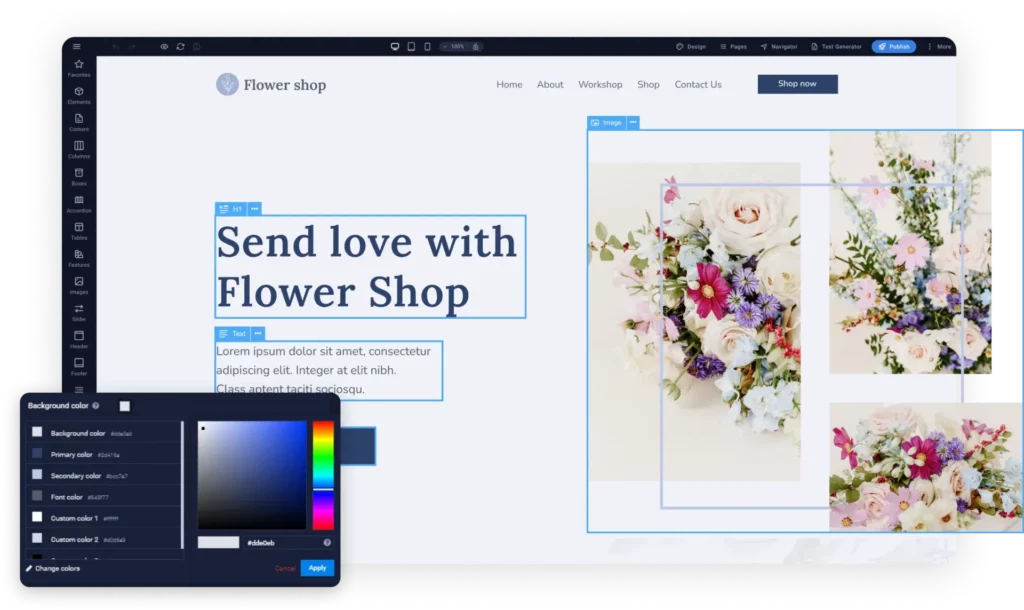
Key Sitejet features:
- You don’t need coding skills to create a website with Sitejet’s intuitive drag-and-drop editor. Just move text boxes, images, buttons, and other design elements around to customize your site the way you want.
- Sitejet offers responsive templates for different site types, such as business websites, online stores, and portfolios, which automatically adapt to different screen sizes.
- For those who want full control, Sitejet lets you dig into the HTML, CSS, and JavaScript of your pages, making customization simple and flexible.
- Planning to sell products or services? Sitejet has built-in e-commerce tools to set up product pages, process payments, and manage your online store with ease.
- If you need help creating content, Sitejet’s AI-powered text generator can create SEO-friendly copy for your site, saving you time and effort.
- Sitejet comes with built-in SEO features to help improve your rankings. You can set custom URLs, add alt text to images, and optimize page metadata for better search visibility.
- If you’re catering to a global audience, Sitejet’s multi-language support lets you translate content, set language-specific URLs, and optimize pages for different regions
- Keep track of all your websites with project management tools. Manage tasks, deadlines, and collaborate with your team easily.
- With unlimited storage and bandwidth, Sitejet ensures that your site won’t slow down or hit limits as it grows.
- Sitejet includes marketing tools like email campaign integration, social media post scheduling, and built-in social sharing buttons to help you reach and engage your audience more easily.
- Share progress with clients and get feedback through Sitejet’s client portal. You can track requests and changes easily.
- Sitejet provides SSL, CDN, and DDoS protection to keep your site secure and fast.
Sitejet Pros:
- Easy-to-use interface with plenty of customization options
- Affordable pricing
- Collaborative features for teams and agencies
- Multi-language support and dynamic content options
- Automatic backups and scalable hosting
Sitejet Cons:
- Small learning curve for new users
Sitejet Starting price:
- $15/month for the solo plan or free with your cPanel instance
Sitejet’s Now Available for Free Directly in cPanel
The free Sitejet Builder is fully integrated into cPanel, making it easy for small businesses, freelancers, and individual users to create websites quickly and directly from their hosting panel. There are no extra logins or setup required.
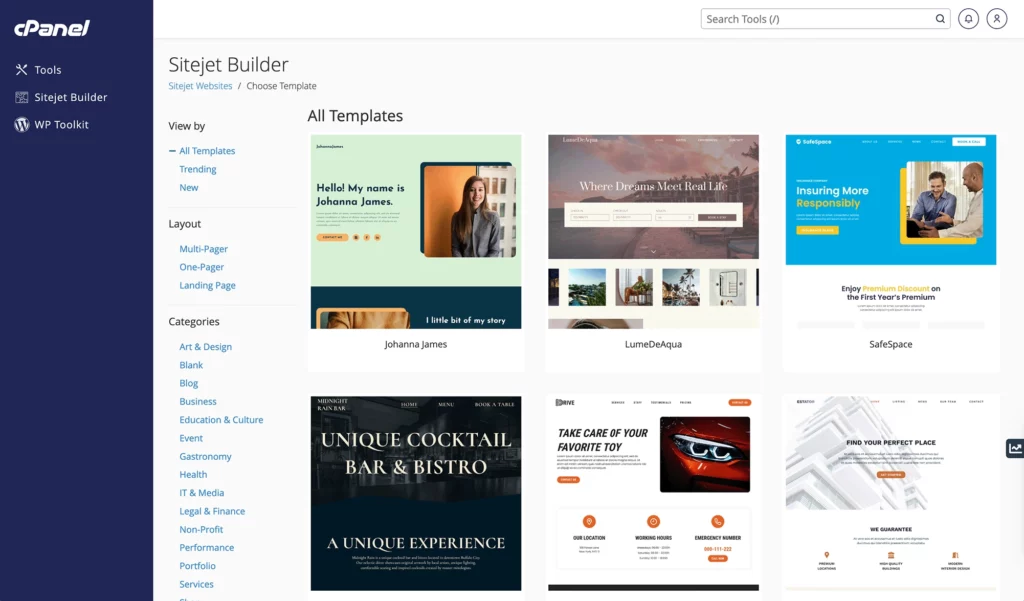
Unlike SaaS tools like Wix or Squarespace, Sitejet is self-hosted and runs inside the user’s cPanel environment.
Need an online store? With just a few clicks, you can activate Sitejet Commerce to add e-commerce features and build your shop directly from the same platform.
Get started with Sitejet and Sitejet Commerce now and create the perfect website for your business, using templates, AI-generated text, and full code access.
2. Wix
Wix is a website builder that makes it easy to create a site without coding. It comes with pre-designed templates, drag-and-drop tools, and AI-assisted design to speed up the process. You can use it to build anything from online stores and portfolios to blogs and business sites.
Users can start with a template or customize layouts with AI-driven tools to arrange content, create sections, and generate images.
Wix also includes business tools like eCommerce features, SEO tools, and marketing integrations to help users establish their online presence.
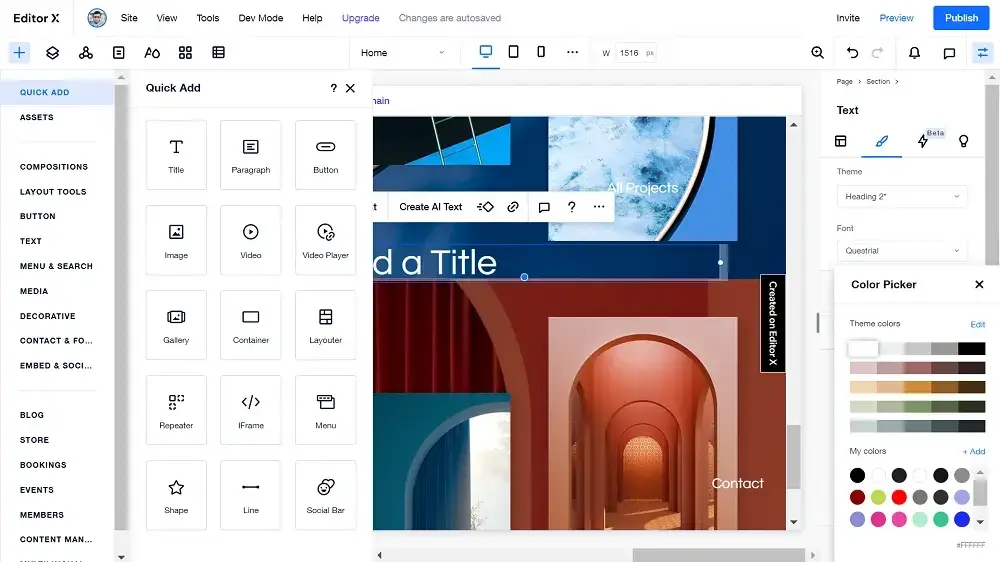
Key Wix features:
- AI-powered tools for automatic content layout, custom sections, and image generation
- Interactive visual effects like VideoBox, Video Mask, and Background Scroll Effects
- Advanced customization with custom code support for UX, CSS, and widget creation
- eCommerce features, including product pages, payment options, and inventory management
- Online booking and scheduling features for service-based businesses
Wix Pros:
- Wix’s AI tools speed up the setup process while allowing for customization.
- A wide selection of mobile-optimized templates for different industries.
- Built-in eCommerce tools, SEO features, and marketing integrations.
Wix Cons:
- Some design and functionality restrictions unless you upgrade.
- Wix sites may load slower as they grow in size and complexity.
- Users wanting deeper customization will need to add their own code.
Wix Starting price:
- $17/month for the Light plan
3. Squarespace
Squarespace is a website builder designed for users who want a polished, professional-looking site. It offers a variety of templates, marketing tools, and built-in SEO features to help improve online visibility.
Users can build websites for businesses, online stores, or portfolios, with customization options that allow for personal branding. The platform also supports eCommerce, appointment booking, and online course creation, all managed from a single dashboard.
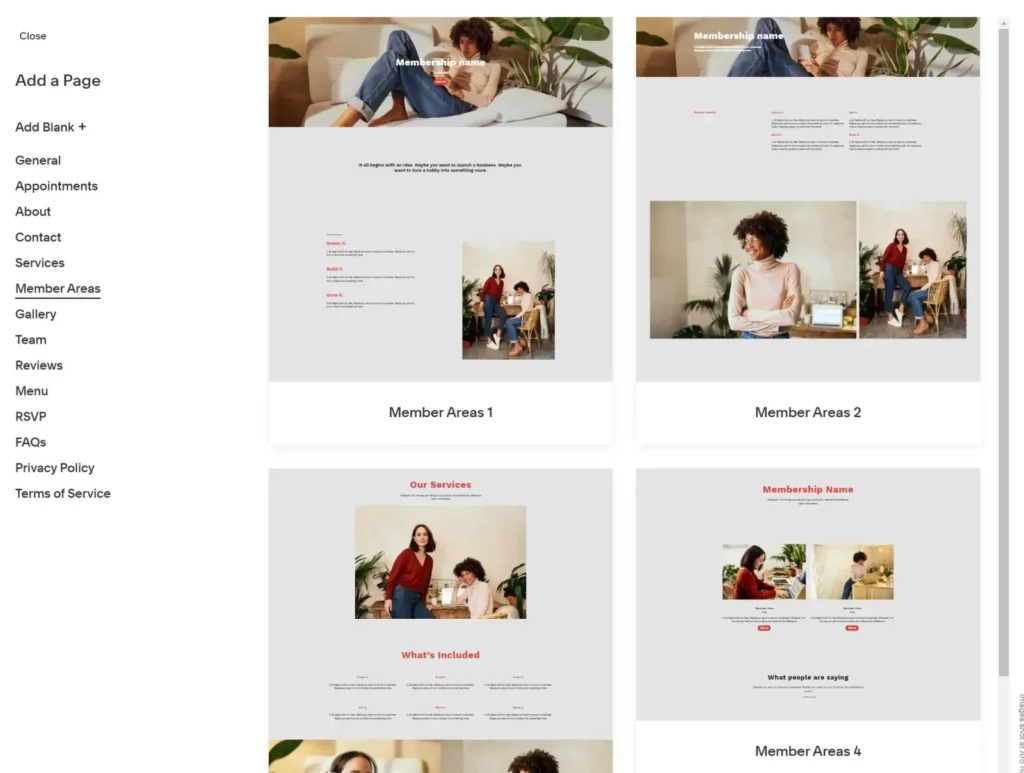
Squarespace Key features:
- Start with a sleek, industry-specific template and easily make it your own with drag-and-drop customization.
- Integrated tools for appointments and invoicing make it ideal for service-based businesses.
- SEO tools, email marketing, and social media integrations to help you grow your business and reach more people.
- Get insights into your site’s performance, including traffic and how your online store is doing.
- Enjoy a free domain for the first year with your plan, making it easy to get started.
- Create and sell online courses or offer membership sites to monetize your content.
Squarespace Pros:
- Ideal for users with no coding experience, offering a smooth and intuitive setup.
- Includes eCommerce tools, SEO, and analytics, reducing the need for third-party integrations.
Squarespace Cons:
- Squarespace can be more expensive than other website builders, especially as you add more features
- While user-friendly, the range of features may take some time to get used to for first-timers
Squarespace Starting price:
- Starts at $25/month
4. Shopify
Shopify is a website builder tailored for businesses that need a reliable platform to manage online stores. It makes it easy to set up and run an online store with customizable themes, apps, and built-in tools. It also takes care of inventory, payments, and marketing, helping businesses grow without the hassle.
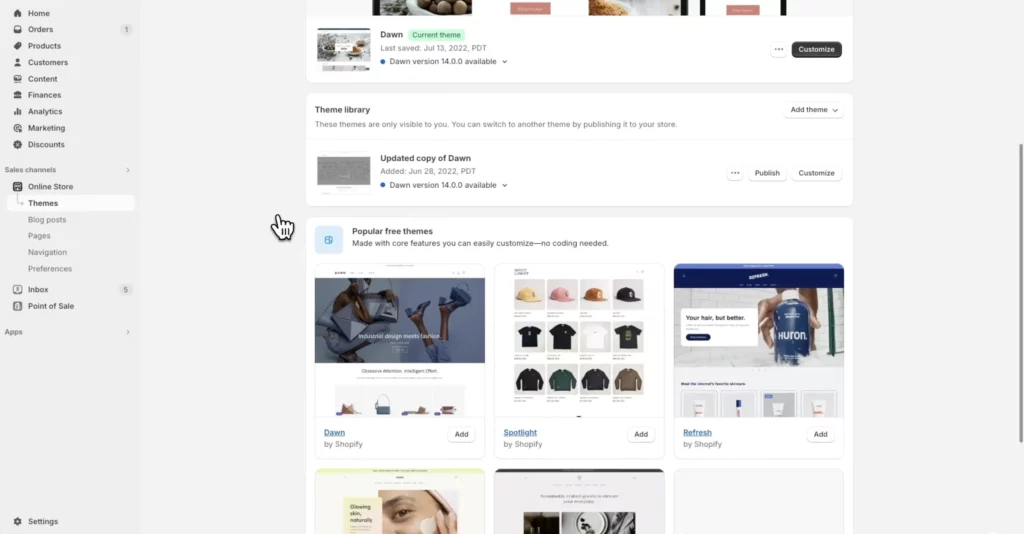
Shopify Key features:
- Easy drag-and-drop builder, no coding needed
- Customize themes, fonts, and colors to fit your brand
- Built-in tools for inventory, payments, and in-person sales
- SEO, email marketing, and social media integrations
- Sell across multiple channels like Facebook, Instagram, and Amazon
- Secure checkout with fraud protection, PCI compliance, and automatic tax calculation
- Mobile-friendly store designs optimized for all devices
Shopify Pros:
- Easy to use, no coding needed
- All-in-one eCommerce platform
- Scales with your business
- Marketing and SEO tools included
- Sell on multiple platforms
- Reliable 24/7 support
- Free trial available
Shopify Cons:
- Costs add up with extra features
- Transaction fees unless using Shopify Payments
- Can feel overwhelming for beginners
Starting price:
- Starts at $28/month
5. Hostinger
Hostinger offers an easy-to-use website builder designed for creating business websites, online stores, and personal portfolios.
Its drag-and-drop editor makes site design accessible, even for beginners. Users can start with a template and customize it to match their brand, whether they’re setting up an online shop, a blog, or a portfolio. Hostinger also includes built-in tools to help with design, marketing, and SEO.
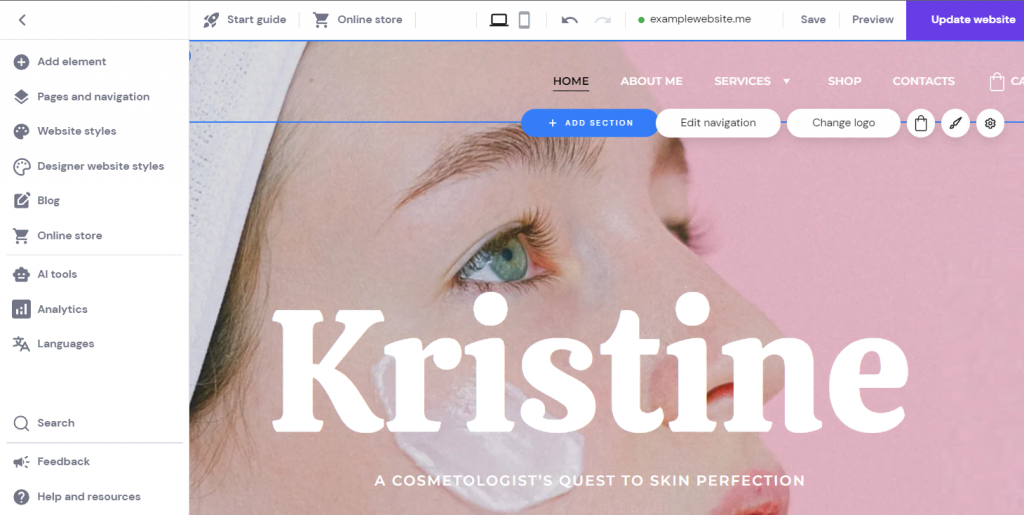
Hostinger Key features:
- AI-powered website builder with drag-and-drop customization
- Direct domain purchase and management
- 150+ designer-made templates for businesses, eCommerce, portfolios, and blogs
- Sell up to 600 products with no transaction fees and 100+ payment integrations
- Built-in product generator and AI tools for product descriptions and image edits
- SEO tools, social media marketing, and email campaign support
- Mobile-friendly design with easy desktop and mobile editing
- Built-in analytics for tracking performance
Hostinger Pros:
- Beginner-friendly with AI-assisted setup
- Full design customization with fonts, colors, and layouts
- Solid eCommerce tools with no transaction fees
- 24/7 live chat support
Hostinger Cons:
- Transaction fees apply unless using specific payment gateways
- Limited customization options compared to advanced website builders
Hostinger Starting price:
- Starts at $11.99/month
6. GoDaddy
GoDaddy Website Builder is a straightforward option for getting a business online without the hassle.
It comes with eCommerce tools, AI-powered features, and built-in marketing support, making it a good fit for small businesses, portfolios, and personal websites. Users can set up an online store, promote their services, or create a site that suits their needs with minimal effort.
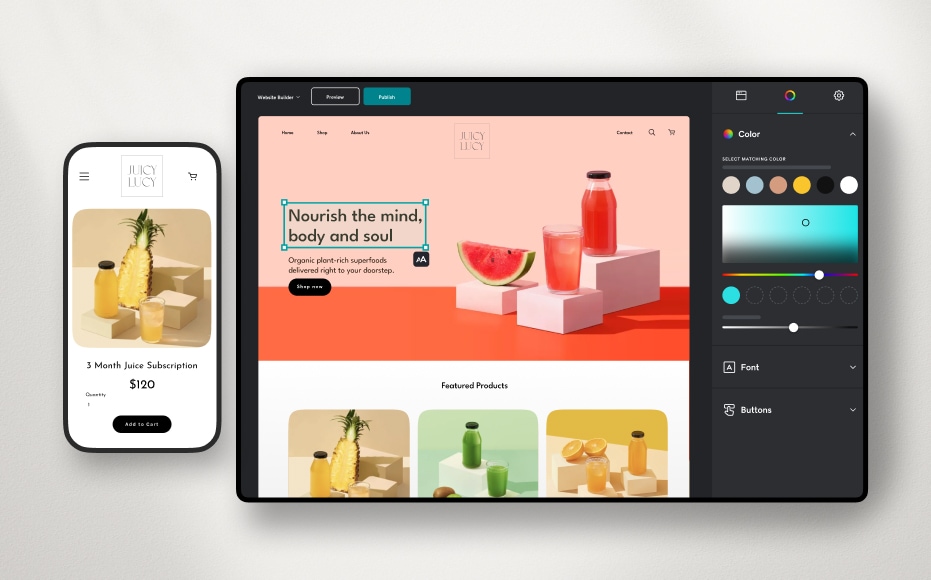
GoDaddy Key features:
- 100+ mobile-friendly templates for businesses and personal brands
- AI-powered domain search and website setup assistance
- Built-in SEO tools, social media integration, and email marketing
- eCommerce features with product listings, flexible payments, and discount tools
- Free professional email and access to stock images
- 24/7 live chat and email support
GoDaddy Pros:
- Simple drag-and-drop editor, no technical skills needed
- Great for small businesses selling products or services
- Built-in marketing tools for SEO, social media, and email campaigns
- Free domain-linked email for branding
- 7-day free trial to test features
GoDaddy Cons:
- Transaction fees for eCommerce unless using GoDaddy’s payment gateway
- Free plan is limited, requiring upgrades for advanced features
GoDaddy Starting price:
- Starts at $12.99/month.
7. WordPress
WordPress is a go-to website builder for everything from blogs to online stores. It’s packed with themes and plugins, letting you customize your site however you want. Beginners and experienced users alike have plenty of tools and a strong community for support.

WordPress Key features:
- Thousands of free and premium themes for full design control
- 58,000+ plugins for eCommerce, SEO, and extra functionality
- Basic SEO tools with plugin support for advanced optimization
- WooCommerce integration for full eCommerce capabilities
- Custom CSS and file editing for complete design flexibility
- Large developer and user community for support and resources
WordPress Pros:
- Highly flexible with themes, plugins, and custom coding
- Free software, only pay for hosting and premium features
- WooCommerce makes eCommerce setup easy
- SEO-friendly with plenty of optimization tools
- Plugins available for nearly every feature
WordPress Cons:
- Steep learning curve for beginners
- A common target for hackers, requiring strong security
WordPress Starting price:
- Starts at $4/month.
8. Weebly
Weebly is an easy-to-use website builder that helps users create professional websites and online stores, no technical skills required.
With a selection of themes, SEO tools, and marketing features, Weebly provides the essentials to build and grow an online presence.
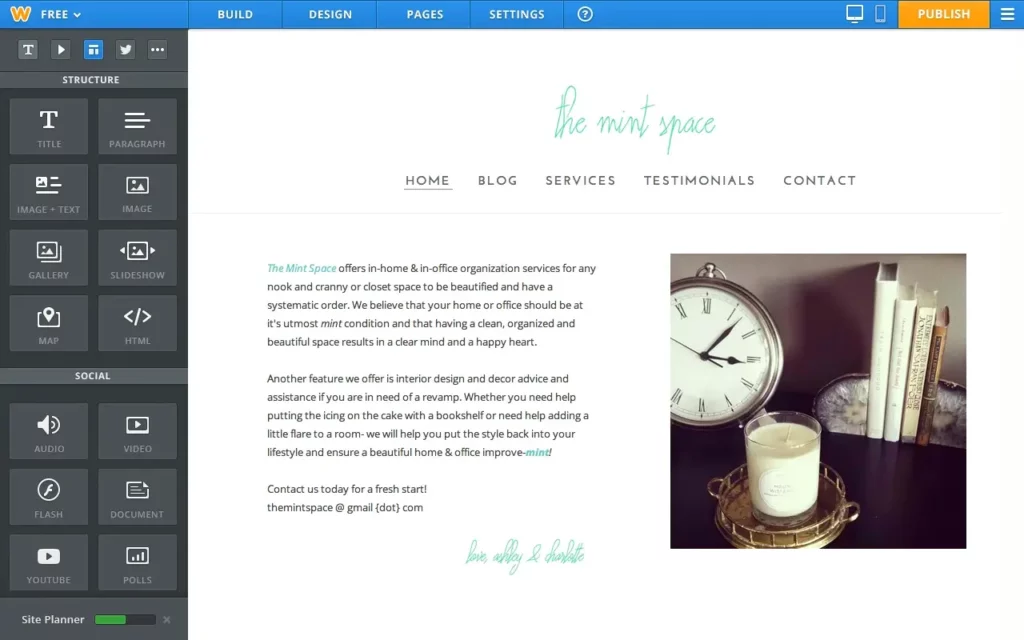
Weebly Key features:
- Customizable fonts and mobile-responsive themes
- Video backgrounds and embedded video support
- Built-in analytics for tracking performance
- Option to edit site code for more control
- Mobile apps for website management on the go
- Free hosting with SSL security
Weebly Pros:
- Beginner-friendly drag-and-drop system
- Free hosting included
- Customizable themes for different needs
- Built-in SEO, email marketing, and social tools
Weebly Cons:
- Limited flexibility for advanced customization
- Transaction fees on eCommerce unless on a paid plan
- Free plan lacks advanced features like email marketing
Starting price:
- Has a free version. Professional plans start at $14/month.
9. Bluehost
Bluehost is a reliable option for building a website, offering both the features and performance you need to create anything from a personal blog to a business site. With Bluehost, you get the support you need to make sure your site works well and looks professional.
You can quickly launch your business site, manage online courses, and even accept payments using WooCommerce and other integrated tools.
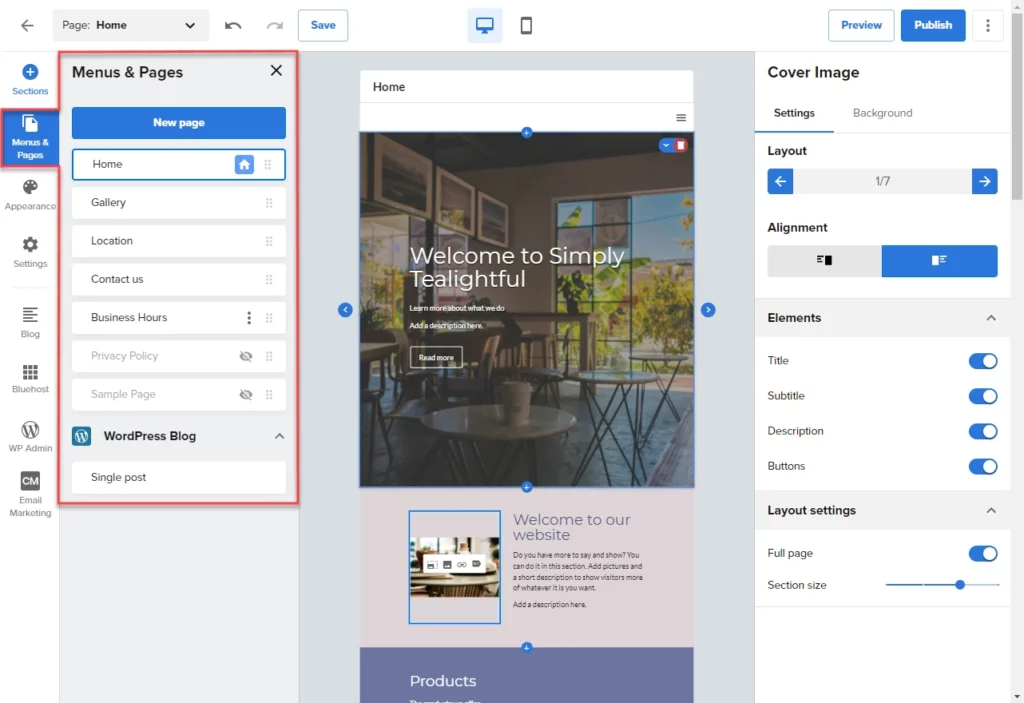
Bluehost Key features:
- AI-powered text and image generation for faster site creation
- Customizable templates for quick setup
- Built-in SEO tools for better search rankings
- Integrated marketing solutions with Google Analytics and email marketing
- eCommerce features with secure payments and shipping options
- Unlimited storage and bandwidth on higher-tier plans
- 24/7 live chat support and troubleshooting resources
Bluehost Pros:
- Free domain for the first year
- All-in-one platform with website building, hosting, and marketing tools
- Great for small businesses looking to scale
- Beginner-friendly with AI tools and drag-and-drop editing
Bluehost Cons:
- Renewal prices increase after the initial term
- Less flexibility for advanced customization compared to other builders
Bluehost Starting price:
- Starts at $11.99/month (you also get a 75% discount in the first year)
10. IONOS
IONOS makes website building easy with AI-powered tools that generate professional sites in minutes. Its AI Website Generator creates a site with relevant images and text based on a few details. You can also start with a template and customize it to fit your brand.
From business websites to portfolios and online stores, IONOS offers the tools needed to get a site up and running with minimal effort.
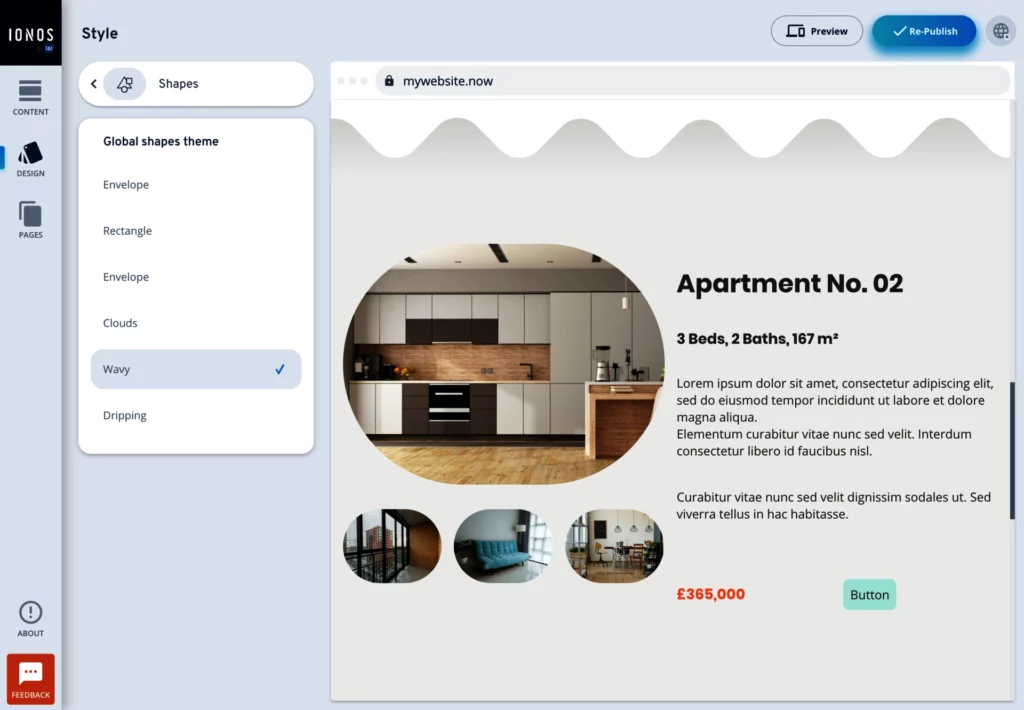
IONOS Key features:
- AI-powered website generation with full customization
- Mobile-optimized templates for various industries
- AI tools for automated text and image creation
- Built-in eCommerce with product listings, checkout, and payments
- SEO and email marketing tools for business growth
- Professional email and reliable web hosting with ample storage
IONOS Pros:
- AI-driven tools for fast website creation
- Easy-to-use editor, perfect for beginners
- Affordable plans for different business needs
- Built-in eCommerce and marketing features
- Includes a professional email and hosting
IONOS Cons:
- AI tools may limit deep customization for advanced users
- Some advanced features require time to master
IONOS Starting price:
- $18/month for the Plus Plan
Frequently asked questions
Sitejet is a great website builder, particularly for designers and agencies. It combines a drag-and-drop editor with powerful customization options, so you can build websites quickly without sacrificing design flexibility.
What sets Sitejet apart is its project management tools, which help you keep everything organized while working on multiple sites. It also includes features like responsive templates and helpful AI tools to make the process smoother.
Sitejet is a solid choice if you’re looking for customization, flexibility, and professional tools, especially if you’re managing multiple client projects. It’s built specifically for web designers and agencies, with strong project management features to keep things organized and efficient.
Wix and Squarespace offer drag-and-drop simplicity and lots of templates if you just want something easy and quick to set up.
For pure eCommerce needs, Shopify is great, it has everything you need to manage products and handle payments without hassle.
Basically, your decision comes down to what’s most important: professional-grade management with Sitejet, ease of use with Wix and Squarespace, or dedicated eCommerce features with Shopify.
The average cost of a website builder typically ranges from $5 to $30 per month. Basic plans typically cost between $5 and $10 per month and include essential features like templates and hosting. For more advanced features, like eCommerce tools, SEO tools, and more customization options, the cost can go up to $15 to $30/month.
Time to choose the right website builder!
To wrap it up, the right website builder really depends on what you’re looking for.
For more flexibility and advanced features, Sitejet is a strong alternative. It offers responsive templates, a drag-and-drop editor, and helpful project management tools.
Whether you’re working alone or with a team, Sitejet gives you the control to create and scale your site without the hassle. It’s perfect for those who want a bit more power and customization while keeping things simple.
